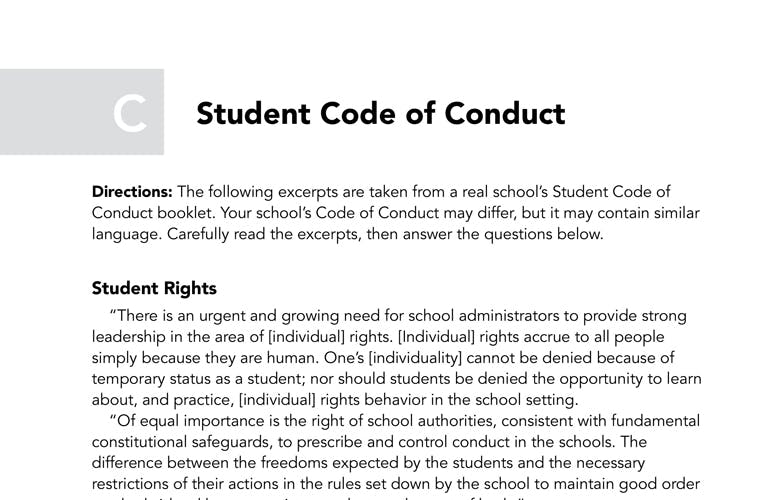Handout C: Student Code of Conduct
Handout C: Student Code of Conduct
Directions: The following excerpts are taken from a real school’s Student Code of Conduct booklet. Your school’s Code of Conduct may differ, but it may contain similar language. Carefully read the excerpts, then answer the questions below.
Student Rights
“There is an urgent and growing need for school administrators to provide strong leadership in the area of [individual] rights. [Individual] rights accrue to all people simply because they are human. One’s [individuality] cannot be denied because of temporary status as a student; nor should students be denied the opportunity to learn about, and practice, [individual] rights behavior in the school setting.
“Of equal importance is the right of school authorities, consistent with fundamental constitutional safeguards, to prescribe and control conduct in the schools. The difference between the freedoms expected by the students and the necessary restrictions of their actions in the rules set down by the school to maintain good order can be bridged by appropriate conduct on the part of both.”
Freedom of Expression
“Students have the right to assemble and express themselves by speaking, writing, distributing, wearing or displaying symbols of ethnic, cultural, or political values such as buttons, badges, emblems, and armbands; or through any mode of dress or grooming style; or through any other medium or form of expression. The principal, or designee, however, may regulate expression, provided the regulation is based on legitimate educational concerns, there is a factual basis for believing a specific form of expression by a specific student is causing or will cause substantial disruption of school activities, or the expression constitutes a health or safety hazard. Students shall also have the right to refrain from expressing themselves in these student originated activities.”
- Referring to Handout A, which Supreme Court cases regarding schools and the First Amendment are reflected in this Code of Conduct?
- According to the Code of Conduct, in what ways, and for what reasons, may students express themselves in school?
- According to the Code of Conduct, for what reasons may school administrators “regulate expression”?
- The First Amendment reads, in part: “shall make no law…abridging the freedom of speech…or the right of the people peaceably to assemble, and to petition the Government.” To what extent do you think that this Code of Conduct is faithful to the protections of the First Amendment? If you went to this school, do you believe you’d be very free to express yourself? Somewhat free? Not very free?
